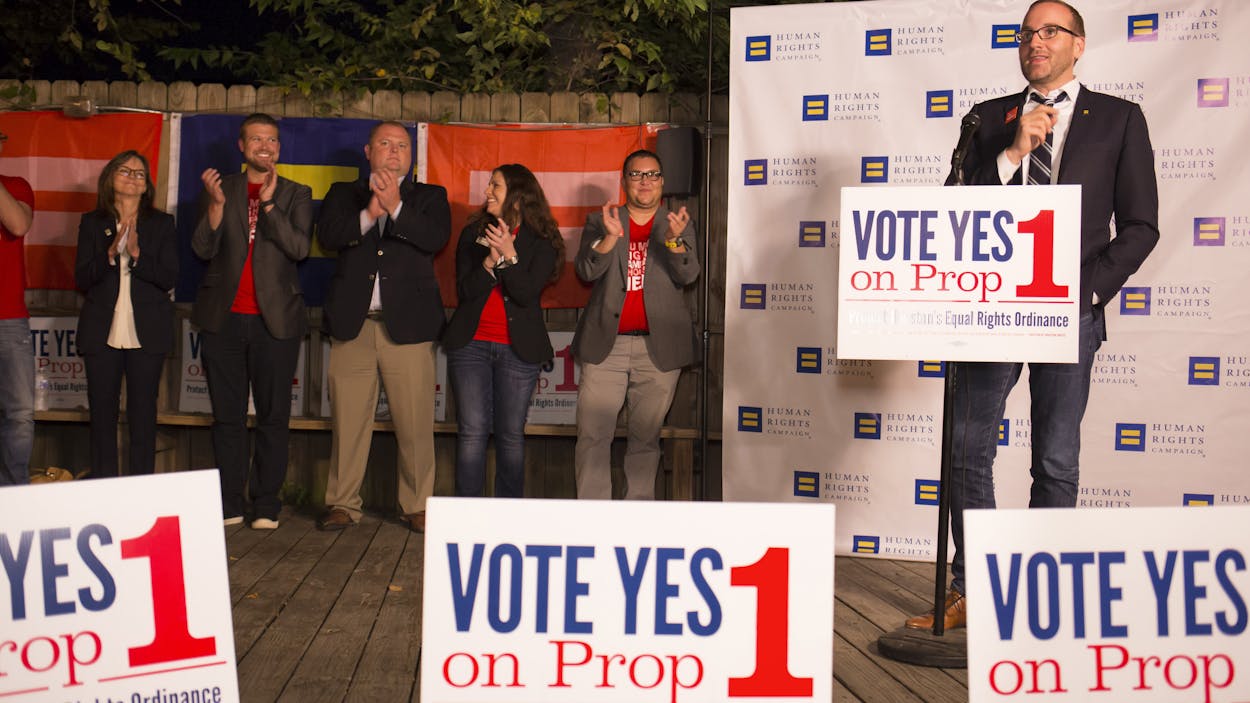The Houston Equal Rights Ordinance’s failure wasn’t really a surprise, even with October polls showing that it was favored by a plurality of voters—43 percent to 37 percent, as of three weeks ago. That it was absolutely crushed was a bit of a stunner.
By a 2-1 margin, the people of Houston, America’s most diverse city and one that elected an openly gay mayor three consecutive terms, voted down an anti-discrimination ordinance that protected fifteen classes of people. Very similar laws were already on the books in every other major Texas city, but Houstonians apparently voted “no” nonetheless because they were terrified bringing in such a law would give sex creeps free reign to prey on women and girls in public bathrooms.
Meanwhile, a #boycotthouston hashtag was starting to pick up on Twitter Tuesday night, much like Houston’s mainstream business community had feared prior to the referendum on the ordinance. Asked about his fears should HERO go down in flames, here’s what Bob Harvey, president of the Greater Houston Partnership had to say:
There’s two levels of threat, the first being the immediate reaction around the country. Where it’s felt most immediately is conventions and tourism. But we’re concerned about corporate relocations. If you’re not seen as being progressive and open to all people, young talent or otherwise, you don’t make the shortlist of spots for corporate relocations for companies outside of Houston. And for international companies, frankly, this issue either doesn’t come up or has already come up and has been resolved. Why would they want to come to a city that’s still debating basic civil rights protections?
If anti-HERO ads appealed to every person’s worst fears, pro-HERO ads played to logic and decency—which was apparently a mistake. Instead of letting the anti-HERO forces define the issue, Houston’s business community should have taken the lead, maybe scripting one ad echoing what Harvey said above, another showing the real threat to Houston’s convention business and major events (namely, the 2017 Super Bowl) that could come from such a resounding endorsement of what the rest of the world will interpret as bigotry.
Because make no mistake – the rest of the world is ever-eager to have their opinion of Texas as a haven for bigots and yahoos endorsed. What plays well in Kingwood and Clear Lake no longer is received well in London, Berlin and New York, and while the local suburbanites might say that don’t give a damn, they might when a multinational uses this as an excuse to choose Atlanta, Dallas, or Chicago over Houston.
Maybe it wouldn’t be so bad if the margin of defeat wasn’t so huge, but when two-thirds of your citizens are perceived as bigots, well, that’s a bit of a problem. And it now seems likely that Houston, a city already beset with oil industry layoffs, a looming pension crisis, major infrastructure issues, and budget shortfalls, is about to face a national and worldwide backlash, no matter how hip and tasty and funky our chamber of commerce tried to portray Houston as, no matter how many consecutive terms we elected the openly gay mayor to serve.
H.L. Mencken said, “Democracy is the theory that the common people know what they want and deserve to get it good and hard.” Maybe outgoing Mayor Annise Parker was a Mencken fan. Maybe that’s why she didn’t want to put this measure, which was approved by Houston’s city council 1106, to a popular vote. Maybe our elected officials wanted to spare Houston the embarrassment it is about to endure on the national stage.
Sometimes even politicians know what’s best for us.







